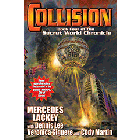Two classic novels from a best‑selling master of SF.
Cradle of Saturn
Discoveries made by colonists on the moons of Saturn show that the Solar System has undergone repeated cataclysms and the last was only a few thousand years. This flies in the face of accepted scientific dogma, and is dismissed by Earth’s authorities—until the planet Jupiter suddenly emits a white‑hot Earth‑sized protoplanet that hurtles sunward on a collision course with Earth.
The Legend That Was Earth
The alien Hyadeans have showered high‑tech gifts on the population of Earth and are offering to make a paradise of the planet. But when wealthy socialite Roland Cade discovers the dark underbelly of the alien presence, and learns that his ex‑wife is one of the so‑called terrorists who are fighting against the alien takeover, he’s forced to choose sides. Soon, he’s caught up in a terrifying conflict that threatens the very existence of the Earth.
-
Product ReviewApparently, Baen will categorize you as a 'master' of science fiction if you simply have a lot of books published. Most of Hogan's work was published in my own lifetime, and as of the date of this review, I'm not even 30; as far as I'm concerned, that throws the 'classic' appellation right out the window, particularly since these stories weren't even from his early work.
I've read, and enjoyed, classic sci-fi (The Immortal Alvin York comes to mind), and although it tends to be a bit weird by modern standards, it at least makes sense. Worlds in Chaos has so many plot holes, logical fallacies, and poor character development that I actually looked Hogan up to see who could have passed this muck off as a book. Turns out that in the later years of his life - during which time both of these stories were written - Hogan had pretty much lost his mind as far as logic and being able to tell the difference between fact and fiction were concerned, preferring to determine an argument or idea's validity based on how well he thought it was presented, rather than on whether it had any resemblance to reality, leading him to become a proponent and defender of numerous thoroughly debunked pseudo-scientific positions, as well as a Holocaust denier. That method of thought is very present in this book, and as far as I was concerned turned it into science-farce rather than science fiction.Posted on





